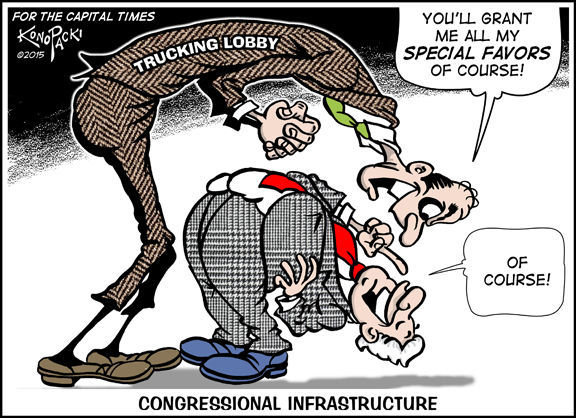A battle is brewing over the Senate transportation bill’s approach to truck safety. Though large trucks are involved in crashes that kill nearly 4,000 people a year -- a number that has grown by 17 percent over the past five years -- the DRIVE Act actually rolls back what few protections exist.

The bill would allow longer and heavier tractor-trailers. Trucking companies would be able to double up two 33-foot trailers behind one truck, even in states that have banned such big loads.
The bill would also cut down on mandated rest periods for truckers, a long-simmering question. Right now, truckers have to rest for at least 34 hours between work weeks, with that 34-hour break including two overnights and the work week not including more than 70 hours of driving. The Senate bill would allow truckers to work 82 hours a week with less rest.
Perhaps most appalling, the DRIVE Act would let teenagers drive commercial trucks.
Yes, the bill would allow 18-year-olds to drive commercial trucks, despite the elevated crash risk of teenage drivers. A raft of legal provisions and insurance standards work to protect the public from notoriously unsafe teen drivers, who pose a danger to society even driving a VW bug, much less a big rig with two 33-foot trailers.
Safety groups and newspaper editorial pages are slamming these proposals as concessions to the trucking lobby that completely disregard public safety. Even a retired executive from the American Trucking Associations, an industry lobbying group, was recently moved to speak out against the changes, noting in the New York Times that while heavy trucks account for less than 10 percent of total miles traveled, they are involved in one in eight of all fatal crashes and about one-quarter of all fatal crashes in work zones.
Trucking companies are continually looking to pinch pennies at the expense of public safety, and this bill lets them. Collision-avoidance technology, increasingly standard in passenger vehicles, is still a rarity in heavy trucks. Trucking companies are reluctant to spend the money for simple vehicle technologies that save lives. As of now, nothing in the DRIVE Act would insist that they do, unless an amendment by Sen. Cory Booker (D-NJ) is accepted.
That amendment is one of 16 endorsed by a letter sent to senators last month by the nonprofit Advocates for Highway and Auto Safety [PDF]. Most of the amendments deal with trucks; nearly all of them were introduced by Sens. Richard Blumenthal (D-CT), Ed Markey (D-MA), or Booker. These measures would make industry safety records public, reduce trucker distractions, increase insurance mandates, and more. Without these simple fixes, the DRIVE Act could directly lead to a higher body count on our streets.





